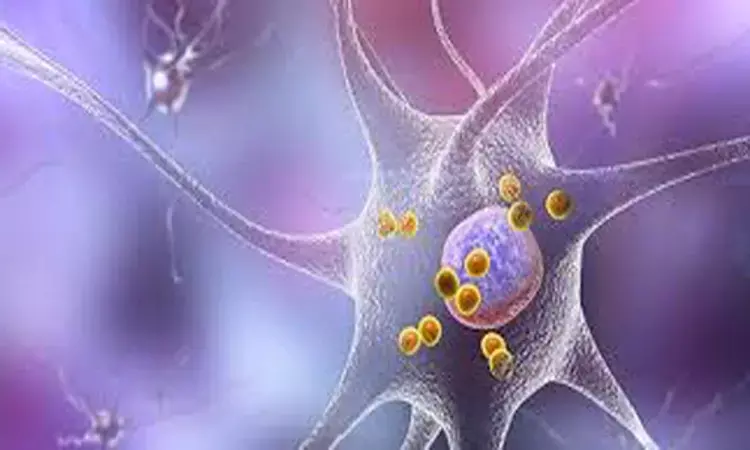- Home
- Medical news & Guidelines
- Anesthesiology
- Cardiology and CTVS
- Critical Care
- Dentistry
- Dermatology
- Diabetes and Endocrinology
- ENT
- Gastroenterology
- Medicine
- Nephrology
- Neurology
- Obstretics-Gynaecology
- Oncology
- Ophthalmology
- Orthopaedics
- Pediatrics-Neonatology
- Psychiatry
- Pulmonology
- Radiology
- Surgery
- Urology
- Laboratory Medicine
- Diet
- Nursing
- Paramedical
- Physiotherapy
- Health news
- Fact Check
- Bone Health Fact Check
- Brain Health Fact Check
- Cancer Related Fact Check
- Child Care Fact Check
- Dental and oral health fact check
- Diabetes and metabolic health fact check
- Diet and Nutrition Fact Check
- Eye and ENT Care Fact Check
- Fitness fact check
- Gut health fact check
- Heart health fact check
- Kidney health fact check
- Medical education fact check
- Men's health fact check
- Respiratory fact check
- Skin and hair care fact check
- Vaccine and Immunization fact check
- Women's health fact check
- AYUSH
- State News
- Andaman and Nicobar Islands
- Andhra Pradesh
- Arunachal Pradesh
- Assam
- Bihar
- Chandigarh
- Chattisgarh
- Dadra and Nagar Haveli
- Daman and Diu
- Delhi
- Goa
- Gujarat
- Haryana
- Himachal Pradesh
- Jammu & Kashmir
- Jharkhand
- Karnataka
- Kerala
- Ladakh
- Lakshadweep
- Madhya Pradesh
- Maharashtra
- Manipur
- Meghalaya
- Mizoram
- Nagaland
- Odisha
- Puducherry
- Punjab
- Rajasthan
- Sikkim
- Tamil Nadu
- Telangana
- Tripura
- Uttar Pradesh
- Uttrakhand
- West Bengal
- Medical Education
- Industry
Cells from gut's nervous system may be involved in Parkinson's disease

Researchers at Karolinska Institutet in Sweden and the University of North Carolina in the USA have mapped out the cell types behind various brain disorders. They have found that cells from the gut's nervous system are involved in Parkinson's disease, indicating that the disease may start there.The findings have been published in Nature Genetics.
The study offers a roadmap for the development of new therapies to target neurological and psychiatric disorders. One interesting finding was that cells from the gut's nervous system are involved in Parkinson's disease, indicating that the disease may start there.
The nervous system is composed of hundreds of different cell types with very different functions. It is vital to understand which cell types are affected in each disorder so as to understand the causes of the disorders and, ultimately, develop new treatments.
Researchers have now combined mice gene expression studies with human genetics to systematically map cell types underlying various brain disorders, including Parkinson's disease, a neurodegenerative disorder with cognitive and motor symptoms resulting from the loss of dopamine-producing cells in a specific region of the brain.
"As expected, we found that dopaminergic neurons were associated with Parkinson's disease. More surprisingly, we found that enteric neurons also seem to play an important role in the disorder, supporting the hypothesis that Parkinson's disease starts in the gut," says one of the study's main authors Patrick Sullivan, Professor at the Department of Medical Epidemiology and Biostatistics at Karolinska Institutet and Yeargan Distinguished Professor at the University of North Carolina.
When the researchers analysed differences in brain tissue from healthy individuals and people with Parkinson's disease at different stages of the disease, they made another unexpected discovery. A type of support cell in the brain called oligodendrocytes were found to be affected early on, suggesting that they play a key role in the early stages of the disease.
"The fact that the animal studies pointed us to oligodendrocytes and that we were then able to show that these cells were also affected in patients suggests that the results may have clinical implications," says Jens Hjerling-Leffler, research group leader at the Department of Medical Biochemistry and Biophysics at Karolinska Institutet and the other main author of the study.
The oligodendrocytes appear to be affected even before the loss of dopaminergic neurons.
"This makes them an attractive target for therapeutic interventions in Parkinson's disease," says Julien Bryois, researcher at the Department of Medical Epidemiology and Biostatistics at Karolinska Institutet and one of the first authors of the study.
The study was financed by the Swedish Research Council, StratNeuro, the Wellcome Trust, the Swedish Brain Foundation, the Swiss National Science Foundation, the US National Institute of Mental Health, and the Psychiatric Genomics Consortium.
Patrick Sullivan reports that he is currently a member of the pharmaceutical company Lundbeck's advisory committee and that he has received grants from them. For the past three years he has been a member of Pfizer's scientific advisory board and received fees from Element Genomics and Roche. Co-author Cynthia Bulik has received grants from Shire and is a member of their scientific advisory board. She is also an author and recipient of royalties from both Pearson and Walker.
For more details click on the link: http://dx.doi.org/10.1038/s41588-020-0610-9
Hina Zahid Joined Medical Dialogue in 2017 with a passion to work as a Reporter. She coordinates with various national and international journals and association and covers all the stories related to Medical guidelines, Medical Journals, rare medical surgeries as well as all the updates in the medical field. Email: editorial@medicaldialogues.in. Contact no. 011-43720751
Dr Kamal Kant Kohli-MBBS, DTCD- a chest specialist with more than 30 years of practice and a flair for writing clinical articles, Dr Kamal Kant Kohli joined Medical Dialogues as a Chief Editor of Medical News. Besides writing articles, as an editor, he proofreads and verifies all the medical content published on Medical Dialogues including those coming from journals, studies,medical conferences,guidelines etc. Email: drkohli@medicaldialogues.in. Contact no. 011-43720751


